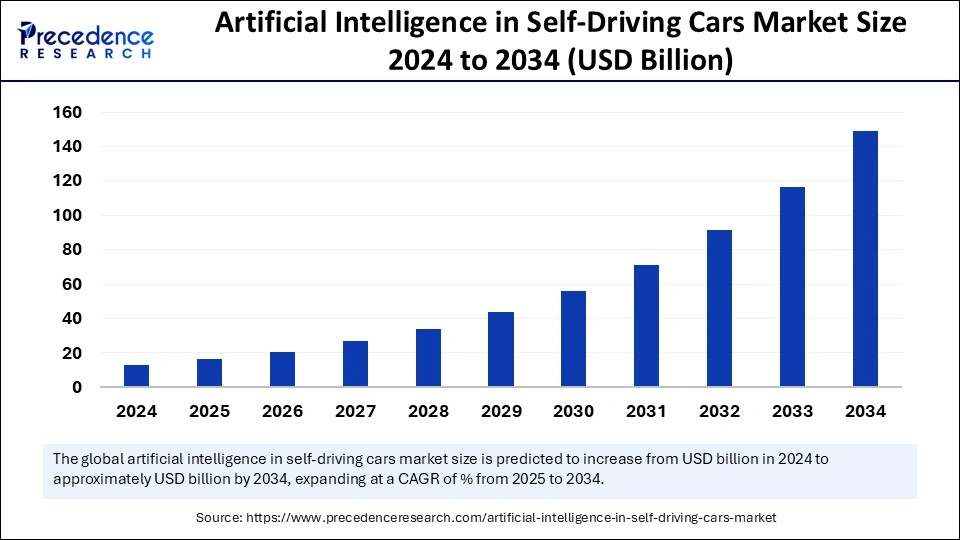 Artificial Intelligence in Self-Driving Cars Market Key Takeaways
Artificial Intelligence in Self-Driving Cars Market Key Takeaways- North America led the global artificial intelligence in self-driving cars market in 2024.
- Asia Pacific is estimated to expand at the fastest CAGR between 2025 and 2034.
- By vehicle type, the passenger vehicles segment captured the largest market share in 2024.
- By vehicle type, the commercial vehicles segment is expected to expand at a significant CAGR over the projection period.
- By application, the driver assistance systems segment captured the largest market share in 2024.
- By application, the autonomous navigation segment is expected to expand at the fastest CAGR during the forecast period.
Market Overview
Artificial intelligence in self-driving cars is transforming the automotive sector by enabling vehicles to navigate without human intervention. With the integration of AI, autonomous vehicles can learn from vast amounts of data collected by sensors and cameras, allowing them to interpret their environment and make intelligent decisions. As AI continues to evolve, it is making self-driving cars safer, smarter, and more efficient.
The market for AI in self-driving cars is poised for rapid growth, with numerous stakeholders from the automotive and tech industries investing heavily in the development of AI-powered autonomous vehicles. This has the potential to reshape transportation systems worldwide.
Drivers
The primary driver of artificial intelligence in self-driving cars is the potential to improve road safety. Autonomous vehicles, equipped with AI, can reduce the likelihood of accidents caused by human error, such as distracted driving, speeding, or fatigue. Additionally, the need for greater efficiency in transportation is pushing the demand for AI in self-driving cars.
AI-powered vehicles can optimize routes, reduce congestion, and lower fuel consumption, especially when integrated with real-time traffic data. The rapid development of electric vehicles (EVs) is also influencing the market, as AI enhances the performance of EVs by optimizing energy use and driving behavior, thereby contributing to sustainability goals.
Opportunities
The opportunities for artificial intelligence in self-driving cars are vast and diverse. One of the most significant opportunities lies in enhancing AI systems that can deal with complex and dynamic driving environments, such as busy urban streets, highway interchanges, and unpredictable weather conditions. AI can also improve user experience by personalizing driving behavior, enabling voice-activated control systems, and integrating with smart city infrastructure.
Additionally, the development of AI-enabled connected vehicles, which communicate with each other and traffic management systems, could further optimize traffic flow and prevent accidents. The integration of AI with 5G networks offers the potential to revolutionize real-time vehicle communication, enabling instant data exchange and faster decision-making.
Challenges
Despite the exciting potential of AI in self-driving cars, there are several challenges that must be addressed. One of the primary concerns is ensuring that AI systems are capable of making safe and reliable decisions in all driving conditions, including inclement weather, complex traffic situations, and unpredictable human behavior. Additionally, the ethical and legal implications of autonomous driving need to be considered, particularly in the event of an accident or failure.
Public acceptance remains another hurdle, as many consumers are skeptical about trusting AI to control a vehicle. Finally, the infrastructure required to support autonomous vehicles, including high-speed internet connectivity, advanced sensors, and updated traffic management systems, represents a significant challenge.
Regional Insights
The U.S. is currently leading the development and deployment of artificial intelligence in self-driving cars, with numerous companies testing autonomous vehicles across various states. Silicon Valley, in particular, is a hub for AI and autonomous vehicle research, attracting significant investments from major tech companies like Google and Tesla. In Europe, several countries, including Germany and the U.K., are investing in AI for self-driving cars, though regulatory challenges remain a significant obstacle to full adoption.
Meanwhile, in Asia, China is rapidly becoming a key player in the AI-powered autonomous vehicle market, with strong governmental support for AI research and the country’s vast consumer base offering a unique market opportunity.
Recent Developments
Recent developments in artificial intelligence for self-driving cars include advancements in machine learning algorithms that enable vehicles to make faster and more accurate decisions. Companies like Waymo, Tesla, and Uber are continuing to refine their AI systems for better performance, particularly in terms of safety and reliability. Autonomous vehicles are increasingly being equipped with enhanced sensors and cameras that provide real-time feedback to AI systems, allowing for better object detection and decision-making.
Additionally, collaborations between automakers and tech companies are accelerating the deployment of AI in self-driving cars, with new partnerships focused on improving the scalability of autonomous driving technology.
Artificial Intelligence in Self-driving Cars Market Companies
- Apple Inc.
- Aptiv PLC
- Aurora Innovation, Inc.
- Baidu, Inc.
- BMW Group
- Ford Motor Company (Argo AI)
- General Motors (Cruise)
- Mobileye (Intel Corporation)
- NVIDIA Corporation
- Tesla, Inc.
- Toyota Motor Corporation (Toyota Research Institute)
- Uber Technologies, Inc.
- Volkswagen Group (Autonomous Driving Program)
- Waymo (Alphabet Inc.)
- Zoox (Amazon)
Segments Covered in the Report
By Vehicle Type
- Passenger Vehicles
- Commercial Vehicles
- Shuttle Services
By Application
- Autonomous Navigation
- Driver Assistance Systems
- Telematics and Fleet Management
- Traffic Management and Infrastructure
By Region
- North America
- Europe
- Asia Pacific
- Latin America
- Middle East and Africa